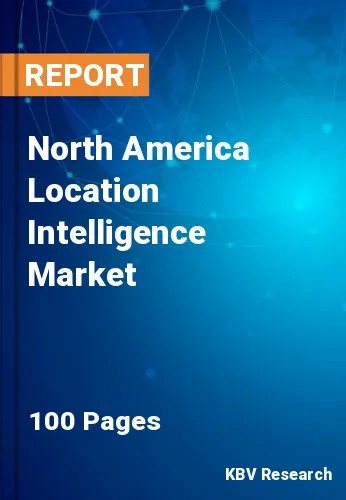The North America Location Intelligence Market would witness market growth of 14.7% CAGR during the forecast period (2022-2028).
Location intelligence technology is a critical business intelligence tool that uses maps and dashboards to make geographic insights easier to share with administrators and decision-makers. Analysts can use the program to integrate several types of data, including demographics, customer relationship management (CRM), and supply chain data. Many of the problems people confront in business or government are related to geographical issues. Advancement of sustainability and equity, tackling the climate problem, and employing real-time analytics to gather operational intelligence in organizations, like commercial real estate as well as retail are just a few of the applications of location intelligence.
The term location intelligence is commonly used to identify the people, data, and technology used to map information spatially. Huge loads of data connected to location (e.g. POIs, demographics, geofences) can be transformed into color-coded pictorial representations that make it easy to observe trends and generate meaningful intelligence using mapping applications like Polaris Intelligence.
The retail and consumer goods sector of countries across the region is one of the most well-established. According to the United States Department of Agriculture, in 2019, total food sales in supermarkets, other grocery stores, warehouse clubs, as well as supercenters in the United States totaled $653 billion (gray bars). The top 20 food retailers sold $410.4 billion worth of food in 2019, contributing to 65.1% of food sales. From 1990 to 2019, this percentage increased by 85.9%. The market shares retained by the largest 4, 8, and 20 retailers decreased slightly before and after the Great Recession of 2007–2009. The longer-term trend of rising sales concentration among the nation's major merchants has resumed after 2012.
The US market dominated the North America Location Intelligence Market by Country in 2021, and would continue to be a dominant market till 2028; thereby, achieving a market value of $8,776.1 million by 2028. The Canada market is poised to grow at a CAGR of 17.3% during (2022 - 2028). Additionally, The Mexico market would witness a CAGR of 16.3% during (2022 - 2028).
Based on Application, the market is segmented into Sales & Marketing Optimization, Asset Management, Remote Management, Customer Management, Risk Management, Facility Management, Workforce Management, and Others. Based on Offering, the market is segmented into Solution and Services (System Integration, Consulting, and Others). Based on End User, the market is segmented into Transportation & Logistics, BFSI, IT & Telecom, Retail & Consumer Goods, Government & Defense, Media & Entertainment, Manufacturing & Industrial, and Others. Based on countries, the market is segmented into U.S., Mexico, Canada, and Rest of North America.
Free Valuable Insights: The Global Location Intelligence Market is Estimated to reach $36 Billion by 2028, at a CAGR of 15.3%
The market research report covers the analysis of key stake holders of the market. Key companies profiled in the report include Robert Bosch GmbH (Bosch Software Innovations GmbH), Autodesk, Inc., Qualcomm, Inc., Tibco Software, Inc. (Vista Equity Partners), Trimble, Inc., Esri, Inc., Navizon, Inc., SuperMap Software Co., ltd., MDA Corporation, and Cuebiq, Inc.
By Application
By Offering
By End User
By Country
Our team of dedicated experts can provide you with attractive expansion opportunities for your business.

